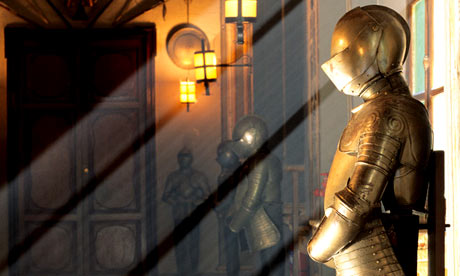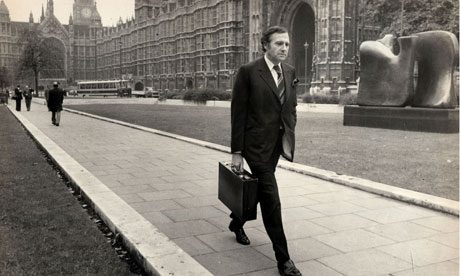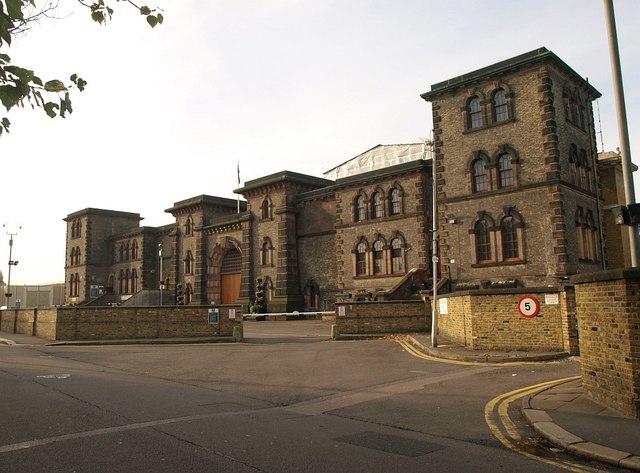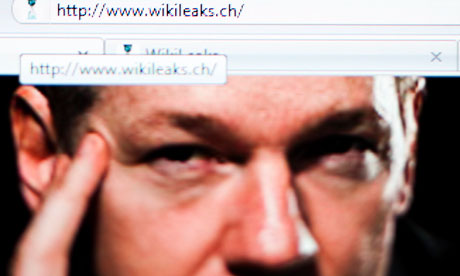Ian Black
Muammar Gaddafi, the veteran Libyan leader, is a "mercurial and eccentric" figure who suffers from severe phobias, enjoys flamenco dancing and horse-racing, acts on his whims and irritates friends and enemies alike, according to US diplomatic cables released by WikiLeaks.
Gaddafi has often been ridiculed in the west, but he is regarded with fear and mistrust in parts of Africa, with leaders and officials expressing anger about his plans for a
United States of Africa, the documents show. President Yoweri Museveni of Uganda even worried about a
possible Libyan attack on his aircraft.
Perhaps more than most world figures, Gaddafi appears to be the object of both political and personal fascination, not least because of the Lockerbie affair and his past support for terrorism. Now 68, and in power since 1969, he has an intense dislike or fear of staying on upper floors, and
prefers not to fly over water, the US ambassador to Tripoli reported before Gaddafi made a controversial visit to the UN in New York in September 2009.
Protocol staff initially balked at supplying the regulation size photograph for his visa application for the trip, "noting that his photo was displayed throughout the city [Tripoli] and that any one of hundreds of billboards could be photographed and shrunken to fit the criteria".
Libyan officials also tried to find accommodation with room to pitch Gaddafi's Bedouin tent, his preferred location for receiving visitors and conducting meetings "as it offers him a non-verbal way of communicating that he is a man close to his cultural roots". Seeking to iron out complications before the trip, a Libyan diplomat was described in a cable as being "painfully aware that Gaddafi's personal whims could scuttle the ministry of foreign affairs' efforts".
Gene Cretz, the US envoy, found him "almost obsessively dependent on a small core of trusted personnel", including a senior aide who speaks to him on a special red phone. He also cited "Gaddafi's well-known predilection for changing his mind".
Visitors should be prepared for surprises, Cretz warned Hillary Clinton before she flew to Tripoli in August 2008.
"Muammar al-Gaddafi is notoriously mercurial. He often avoids making eye contact during the initial portion of meetings, and there may be long, uncomfortable periods of silence. Alternatively, he can be an engaging and charming interlocutor … a self-styled intellectual and philosopher, he has been eagerly anticipating for several years the opportunity to share with you his views on global affairs.
"Intellectually curious and a voracious consumer of news - trusted advisers are tasked with summarising in Arabic important books and articles printed in other languages."
Writing about last year's celebrations of the 40th anniversary of the Libyan revolution, the envoy focused on Gaddafi's preferences for dancing and cultural performances. He had "appeared particularly enthralled by Tuareg horse racing … clapping and smiling throughout. Flamenco dancers appeared to spark a similar interest." Gaddafi planned to stop in Seville on his way to
Libya from Venezuela to attend a flamenco performance.
A US embassy informant spoke of an unflashy lifestyle in "modest quarters, with prefabricated walls and floors that creak. The walls are white and do not feature any artwork."
Another report described how his Bab al-Azizia compound in central Tripoli has facilities for banquets and other public events, "
but is not lavish in any way compared with the ostentation of the Gulf oil state families or [the] Hariri clan [in Lebanon]."
House staff dress in street clothes rather than uniforms, while Gaddafi normally wears jogging suits to meet one regular guest, a consultant who described the leader as "paranoid about those around him, including his interpreters". He apparently did not even have his own bank account.
Gaddafi was reportedly pleased with his performance at the UN general assembly in 2009, when he spoke for 96 minutes instead of the allotted 15. The leader had "kept many things bottled up" for 30 years and was able to express them on the world stage, the embassy recorded. Gaddafi "felt he needed to speak his mind and express his frustration with issues that had been weighing on him – including his thoughts on the assassination of President John F Kennedy".
The informant called his attitude to the US "childlike", quoting him asking: "How much of New York … will I get to see?" and "Is Washington far from New York? Do you think I might have time to visit?"
US diplomats report extensively on Gaddafi's family, especially his sons Saif al-Islam and Muatassim. But, one cable notes, "since the family keeps a tight control on the media and most of the Gaddafi children's spending excesses take place outside Libya, there is not much public reaction to the coffers of Gaddafi Inc".
Family issues came to the fore when another son, Hannibal, became embroiled in a huge row over claims about allegedly beating a servant during a visit to Switzerland, triggering a severe diplomatic crisis between Tripoli and Berne whose resolution depended on whether the "notoriously ill-behaved and capricious first family changes its mind". No claim was ever pursued by the Swiss.
Reports from US embassies elsewhere in Africa provide copious evidence of high levels of mistrust. In addition to worrying about having his plane shot down, Uganda's Museveni complained of Libyan approaches to other leaders. "
Gaddafi is trying to buy them off or intimidate them by destabilising their countries unless they agree with union," he said.
Press and independent sources reported that during a visit to the Guinean capital Conakry,
Gaddafi gave a bulletproof Nissan vehicle to President Moussa Dadis Camara. A "sensitive source" told the US embassy that he also gave the president a large sum of cash.
On the subject of the African Union a Swazi diplomat mentioned his amusement at receiving a diplomatic note with Gaddafi's new title as
"King of Culture".
Still, the US cables do show evidence of Gaddafi's mellowing over the years. "Every time we put out a fire in Africa, another one breaks out," he told the visiting US General William Ward of the US Africa Command. "We used to say this was a US conspiracy, but not anymore."
For the American ambassador to Tripoli, the conclusion about where US interests lie was clear: "While it is tempting to dismiss his many eccentricities as signs of instability, Gaddafi is a complicated individual who has managed to stay in power for 40 years through a skilful balancing of interests and realpolitik methods. Continued engagement with Gaddafi and his inner circle is important."




